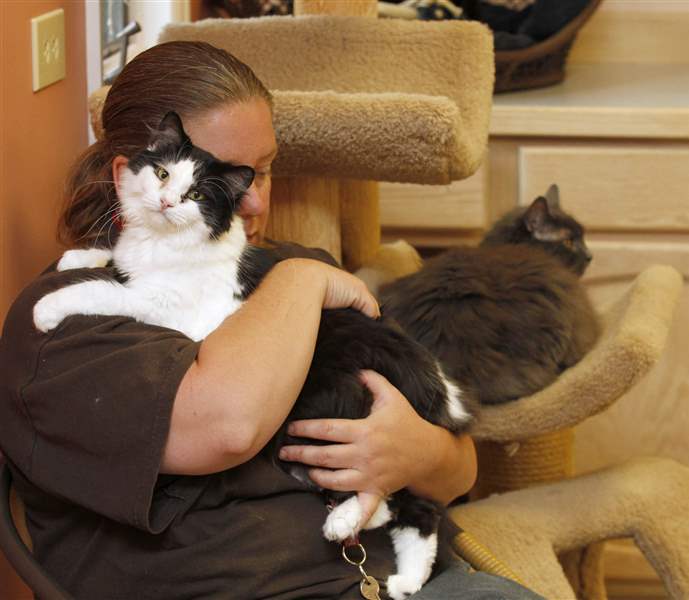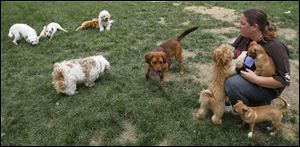
Save-A-Pet shelter provides home-like setting
7/8/2011
Maumee Valley Save-A-Pet worker Jaime Snyder cuddles a shelter cat. The organization was founded on the belief that every companion animal deserves a loving, responsible, and permanent home.
THE BLADE/LORI KING
Buy This Image

Dogs at Maumee Valley Save-A-Pet in southwest Toledo race inside and outside, tumble around in the grass together, chase, lick, and play-fight under the watchful eye of shelter worker Jamie Snyder. Save-A-pet is a no-kill shelter.
Next week: A look at the relationship between the Lucas County dog warden and area pet groups.
Picture a day-care center where instead of children, the inhabitants are dogs and cats. There's homey furniture -- a couch, tables, even a wash basket filled with cushions; a brightly lit "cat room" where felines lounge together in Zen-like calm; a big, grassy backyard where dogs run in and out as a pack much of the day, and an activity room where both species peacefully play together.
There are no built-in kennels or cat pens. A handful of cages serve as sleeping quarters for the dogs at night, but their doors remain open during the day.
The animals live in groups, moving freely about in their rooms, the yard, and even through the hallway.
The place is Maumee Valley Save-A-Pet in southwest Toledo.
PHOTO GALLERY: Dogs and cats play and romp at Maumee Valley Save-A-Pet in Toledo.
"We try to make our shelter more of a home environment. It's not just cages, it's couches and furniture and a TV with a video ... ," organization president Lori Friedes said. "We try to make it more like a home away from home so when [the animals] go to a home it's not a foreign environment."
Open just two years, the Save-A-Pet shelter offers a starkly different approach to housing stray and unwanted animals compared with traditional shelters or dog pounds. The emphasis is on allowing cats and dogs to socialize, both with their own kind and with the opposite species. It's a set-up that keeps the animals happy, helps iron out behavior problems, and creates easier-to-manage, more adoptable pets, the shelter's behaviorist, Doug Ritter, indicated.
"It's hard to find a rescue group that's willing to work with groups as a group. Most shelters and rescues, the dogs are in cages all day long," said Mr. Ritter who also runs his own shelter and dog training center, Dundee K9, in Dundee, Mich. "Everybody knows that dogs are pack animal and cats are more independent. But usually the cats are free-roaming and the dogs locked in cages ... That's kind of backwards to the way nature would be."
There are currently 10 dogs and about 50 cats at the Maumee Valley Save-A-Pet shelter at 5250 Hill Ave. Most of the animals are surrendered by people who can't take care of them or who have found them as strays. Save-a-Pet has also taken in nine dogs from the Lucas County Dog Pound since the shelter opened, shelter manager Lisa McKensie said.

Maumee Valley Save-A-Pet worker Jaime Snyder cuddles a shelter cat. The organization was founded on the belief that every companion animal deserves a loving, responsible, and permanent home.
Save-A-Pet pays for its operations through fund-raising events such as auctions and rummage sales as well as donations. A large bequest by two local women enabled the group to open the shelter in 2009. Before that, Save-A-Pet volunteers looked after dogs and cats in their own homes.
All of the dogs at the shelter, except one, are small-breed dogs or puppies. Ms. McKensie said she can usually only accept small to medium-sized dogs for space reasons, although there is usually one larger dog at the shelter. The dogs live together in a space that used to be a garage and frequently spend time in the backyard or in the activity room with the cats. The one exception is Ginger, an elderly Labrador mix who suffers from allergies and prefers to spend her time on top of the wash basket in the hallway, alongside several cats.
Spend a few minutes with the dogs, and it's obvious they are the best of friends. They race inside and outside, tumble around in the grass together, chase, lick, and play-fight.
"They all get along really well, like a big happy family," Ms. Friedes said, adding that the cheery atmosphere often comes as a surprise to visitors familiar with more traditional shelters. "The animals think they're at home."
For several hours a day -- more during the winter -- the dogs and some of the cats spend time together in the activity room. Volunteers supervise the animals to make sure they get along. New dogs are introduced slowly to the cats and are kept on a leash until they can be trusted. Mr. Ritter said newer dogs that react aggressively to cats can be trained to act differently with the help of the pack. The dog will see that his fellow canines do not attack the cats and, after being told not to annoy the cats a couple of times, will act accordingly, the trainer said.
"If you have five, six dogs that are already trained and well-behaved that makes it easier," Mr. Ritter said. "Once he tries three or four times in a row he'll knock it off."
Mr. Ritter spends time training the dogs at the shelter and will take individual canines home with him to socialize with his own pack of dogs when he finds they need additional help. But, he added, simply allowing the animals to live as a group makes their behavior better.
"They are socialized and well-adjusted," he said. "They're loose, they've got their friends, they have fun, they've got food all day ... whatever they need is there. And they've got each other."
When it comes to finding homes for the dogs, shelter manager Ms. McKensie stresses "quality over quantity." People interested in adopting an animal are not allowed to take it home the same day, but must instead fill out a form and mull over their decision for a few days. Meanwhile, staff review details of the person's home environment and lifestyle to make sure the animal is a good fit, contact landlords to ensure pets are permitted in the home, and check references. If the person has other pets, those animals must be given a health check and brought in to meet the new dog or cat.

Dogs and cats roam at will at Save-A-Pet's shelter at 5250 Hill Ave.
"We want people to stop and think about the commitment," Ms. McKensie said. "We don't want people to be impulsive."
The result of this careful process, and the behavior benefits from socialization and training at the shelter, mean very few people return pets they have adopted, Ms. McKensie maintained. She and Mr. Ritter will provide behavior advice to new pet owners as needed once they have the animal in their homes. Since the shelter opened in 2009, fewer than five dogs and five cats have been returned to the shelter, Ms. McKensie said. Last year, the organization adopted out more than 100 dogs and cats.
Maumee Valley Save-A-Pet is a "no-kill" shelter, meaning it does not euthanize any animals in its care unless a veterinarian determines an animal is too sick or injured to be saved. Because the shelter is small it cannot accept all of the animals brought to it and generally cannot take more than one large dog at a time, Ms. Friedes added.
Shelter staff try to find alternative places for the animals they are unable to help, she said.
The organization also has a handful of members who foster animals that are too ill, injured, or fragile to be adopted right away.
"Rescue, rehabilitate and rehome. That's our mantra," the president said.
For more information on Maumee Valley Save-A-Pet call 419-537-9663 or visit maumeevalleysaveapet.org. The shelter is open Wednesday through Saturday, from noon to 5 p.m.
Contact Claudia Boyd-Barrett at: cbarrett@theblade.com or 419-724-6272.